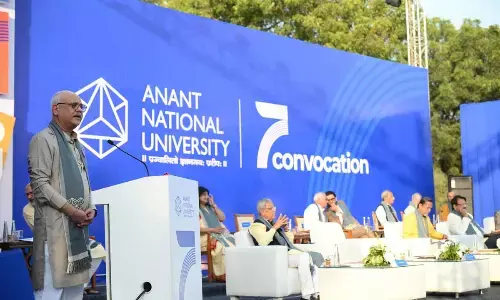Prick the heel for a healthy life

Despite overwhelmingly high birth rates in India, the child care services are quite inadequate. The inability to focus on the infant care which is of utmost importance to identify genetically acquired defects, are unidentified and this escalates over a time causing immense hardship to both the parents and child. It is vital to identify defects of the baby right after the birth.
Despite overwhelmingly high birth rates in India, the child care services are quite inadequate. The inability to focus on the infant care which is of utmost importance to identify genetically acquired defects, are unidentified and this escalates over a time causing immense hardship to both the parents and child. It is vital to identify defects of the baby right after the birth.
Today most parents opt out of newborn screening test thinking it is unfair on their part to let a newly born infant to undergo the perils of an intensive screening process. However, quite contrary to such largely prevalent misconceptions, identifying conditions that can affect a child’s long term health.
With an early diagnostic tests which are performed within 24 - 48 hours of child’s birth can identify the causes and detect the possible higher risk of developing disorders among infants such as permanent neurological, cognitive, tactile, and physical damage in the child.
For premature babies, the test is first conducted during this period and another one repeated once the baby is full-term. A typical NBS test is conducted by pricking a baby’s heel to extract a small quantity of blood which is then screened to detect any abnormalities which may be a sign of treatable medical condition.
Another test is the hearing test which is conducted usually when the baby is asleep using special equipments. Babies who do not have any family history of disabilities and disorders are also diagnosed with critical medical conditions.
Therefore, it is advisable for parents to mandatorily take their babies for a newborn screening test within hours of birth. It is basically a preventive pediatric screening service provided to all newly born children to assess the possibility of genetic disorders in the area of ‘Inborn Errors of Metabolism’. However if it is detected early enough, it can be easily treated. The treatment and care is for lifelong.
If the abnormalities or diseases are detected within 2-3 days of the child’s birth, lot of these are curable. Identification is the first step towards finding a cure or a solution. There’s a document from Rashtriya Bal Swasthya Karyakram, released in September 2016.
It has a comprehensive view about screening and states that screening on birth or delivery point is extremely crucial and highly advised. They also have a manual for screening visible defects, after the birth of the child.
Lack of total Newborn Screening coverage is caused due to poor economy, insufficient health education, lack of early government support, early hospital discharge, and large numbers of out-of-hospital births. After 50 years since Neonatal Screening was initiated in USA, the Health Ministry of India in 2012 started the initiative of introducing Newborn Screening in the country.
Indian Council of Medical Research (ICMR) and the Ministry of Health have been considering and supporting the research in incidence rate and prevalence in India of various Inborn Errors of Metabolism.
About 70 percent of the babies in India are born in government hospitals that lack any structured program to do Newborn Screening to identify any defects/ disabilities. However, many of the private hospitals and maternity clinics undertake these tests and hence are able to provide necessary advice to the parents. The writer is the CEO of Trivitron Healthcare- India
By Dr P Siva Kumar








